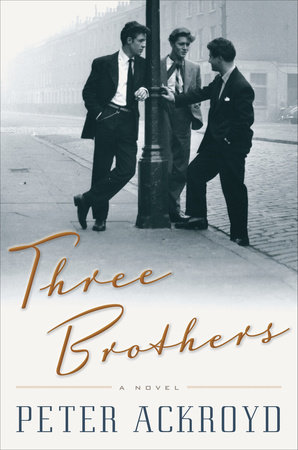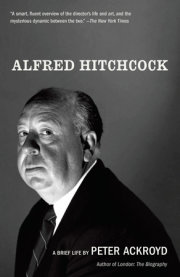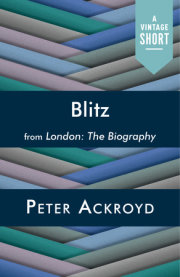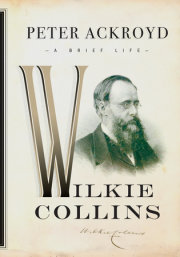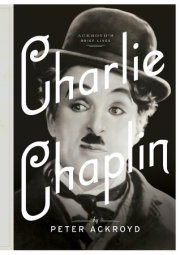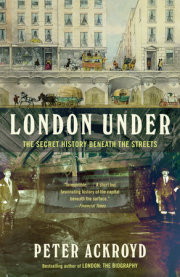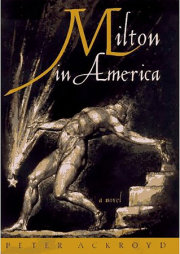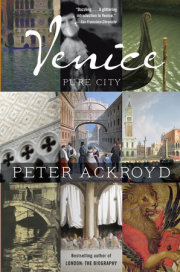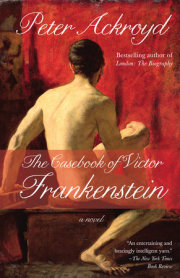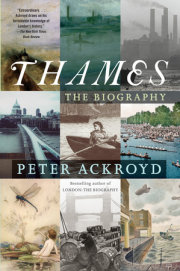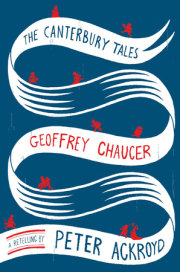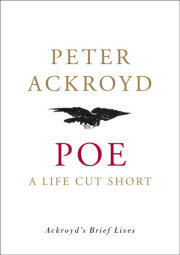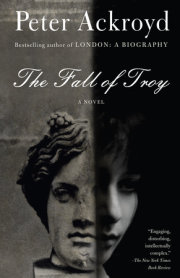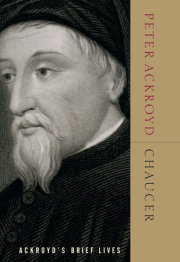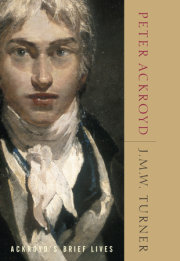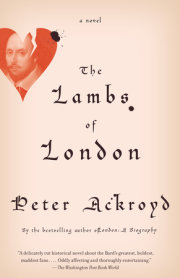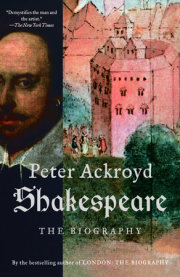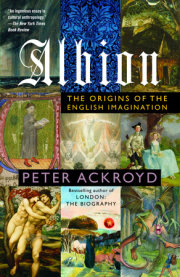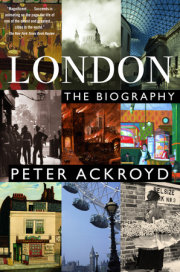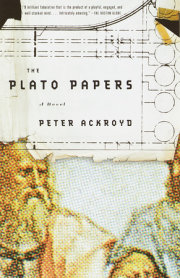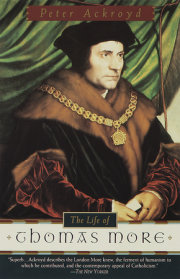I
Cheese and pickle
In the London borough of Camden, in the middle of the last century, there lived three brothers; they were three young boys, with a year's difference of age between each of them. They were united, however, in one extraordinary way. They had been born at the same time on the same day of the same month--to be precise, midday on 8 May. The chance was remote and even implausible. Yet it was so. The local newspaper recorded the coincidence, after the birth of the third son, and the Hanway boys became the object of speculation. Were they in some sense marked out? Was there some invisible communion between them, apart from their natural affinity?
The interest soon subsided, of course, in a neighbourhood where the daily struggles of existence were still evident four or five years after the War. In any case, there were other differences between the boys--differences of temperament, differences of affection--that soon became manifest. These diversities, however, were still mild and pliable. They had not yet become the source of great disagreement or hostile division.
The three boys were young enough, and near enough in age, to enjoy the same pastimes. On the pavement outside their small house in Crystal Street they chalked the squares of hopscotch. They played marbles in the gutter with fierce concentration. They hardened the seeds of the horse chestnut with pickle juice and brine, so that they could compete with conkers. They raced each other on the common, at the edge of the council estate in which they lived. They explored the deserted tracts of land beside an old railway line, and trod cautiously among the debris of an abandoned bomb shelter.
On the common, too, they played the old game "Run Run Away." One of them, with a scarf wound about his eyes as a blindfold, repeated a few well-known words as the others ran as far as they could; when he stopped speaking, they had to remain quite still. He then had to find them, and the first one he touched became "it" when the whole game began again.
On one particular afternoon the youngest of them, Sam, was standing, his eyes blindfolded, and he began to shout out the words.
"When I was standing on the stair
I met a man who wasn't there.
He wasn't there again today.
I wish, I wish he'd go away.
Here I come, ready or not!"
After a minute or two of threshing around he caught hold of his oldest brother, Harry. But there was no real excitement in the game. They had played it too often.
"Listen," Sam said, "what do you both want to be when you grow up?"
"I want to be a pilot."
"I want to be a detective."
"Do you know what?" Sam told them. "I don't want to be anything."
The sky was growing darker, and a cold breeze had started up across the common with the promise of light rain. "Come on," Harry said, pointing to the abandoned bomb shelter, "let's all go under the ground. I've got some matches. We can start a fire. Mum won't miss us till teatime. Let's start a fire that will go on for ever!"
"I dare you."
"I double dare you."
So one by one, in single file, following each other, they descended into the earth.
#
They had a small back garden, in which they investigated the lives of earwigs and other insects. At the bottom of this garden there was an old stone basin often filled with rainwater, and in this they raised tadpoles caught from the pond on the edge of the common. They put their heads together and peered down into the murky water, their sweet liquorice breath mingling with the dank odour of moss and slime. They tried to grow beans and peas in the garden, but the shoots withered and rotted away. It was, in short, a London childhood. They had never seen mountains or waterfalls, of course, but they lived securely in their world of brick and stone.
They recognised by instinct the frontiers to their territory; a street further north, or further south, was not visited. It was not welcoming. But within their own bounds they were entirely at home. They knew every dip in the pavement, every front door, every cat that prowled along the gutter or slumbered on the window sill. They knew, or at least recognised, most of the people they saw. There were few strangers in the neighbourhood. They lived among familiar faces.
Any stranger who happened to walk through the neighbourhood would not have come away with any distinct impression. It was a council estate, built in the 1920s, of two-storey red-brick terraces. That was all. One row of houses was interrupted by some small shops--a newsagent, a hairdresser, a butcher among them--and on the corners of the narrow streets were general stores or public houses. There was a fish-and-chip shop, and a bakery, in the street where the Hanways lived. The district smelled at various times of dust and of rain, of bonfire smoke and of petrol. Its sounds were not of cars but of trams and milk-floats, with the distinct but distant roar of London somewhere around the corner. It had the forlorn calm of a poor neighbourhood, yet for the three brothers it repaid the closest possible attention. It was the source of curiosity, of surprise, and, sometimes, of delight. The centre of their lives was very small, but it was brightly lit. And all around stretched the endless streets, of which they were largely unaware.
Their first memories of childhood differed. Harry recalled how he had managed to walk unaided across the carpet of the small living room, praised and encouraged by his parents sitting on a yellow sofa. Daniel, between his brothers in age, remembered being taken out of a pram and held up to the sunlight, in which he seemed to soar. Sam's first memory was of falling and cutting his leg on a shard of broken glass; he had cried when he saw the blood. Had their respective memories ever come together, they might have had some understanding of their shared past. But they were content with these fragments.
They attended the same primary school, a red-brick building set beside a grey-brick church, where the signs for "Boys" and "Girls" were carved in Gothic script above two portals. The school smelled of soap and carbolic disinfectant, but the classrooms were always cluttered and dirty with a faint patina of dust upon the shelves and windows.
The Hanway boys were in separate classes, according to their age, and in the playground they did not care to fraternise. Harry was the most gregarious and thus the most popular of the brothers; he laughed readily, and had a circle of acquaintances whom he easily amused. Daniel had two chosen friends, with whom he was always deep in consultation; they collected bus numbers and cigarette cards, which they would compare and contrast. Sam, the youngest, seemed content to remain on his own. He did not seek the company of the other children. And they in turn left him alone. But Sam had a temper. One morning, at the gate of the school, a boy remarked on the fact that Sam had torn his school jacket. Sam struck out at him with his fist and knocked him to the pavement. His two brothers witnessed the event, and adjusted to him accordingly.
Harry Hanway was ten, Daniel Hanway was nine, and Sam Hanway was eight, when their mother disappeared. They returned late one afternoon from school, and found an empty house. Harry made sandwiches of cheese and pickle. They sat around the kitchen table, and waited. No one came.
#
Their father, Philip, was employed as a nightwatchman in the City. He always left the house in the afternoon, stopped at a pub on Camden High Street, and then took the bus to the financial headquarters where he worked. He would put on his dark blue uniform, kept in a small locker off the main hall, and then sit behind an imposing central desk. He always had with him pencils and paper. After a few minutes of concentration he would begin writing, slowly and hesitantly; then he would stop altogether. For the rest of the night he would smoke and stare into space.
He had been called up for the army, in the third year of the War, but in fact travelled no farther than Middlesbrough where he was assigned to the barracks as a clerk of munitions. He remained in that post until the end of the War when, with army pay in his pocket, he returned to London. He had been brought up in Ruislip, but he had no intention of returning. Ruislip was the place where he had waited impatiently for his real life to begin. Instead he set off for Soho. He believed that he was destined to be a writer. When he was a schoolboy, he had read an English translation of The Count of Monte Cristo over several weeks; he had devoured it, page by page, elated and terrified by the turns of the plot. The day after he finished the novel, he began his own story. He never completed it. He put the pages in a biscuit tin, where at the time of this narrative they still lay. Yet he was not discouraged. He began writing other stories, to which he could never find a satisfactory conclusion. The more disappointment he suffered, the more intense his ambition became. He recalled the last words of The Count of Monte Cristo, "wait and hope."
So he migrated to Soho in search of publishers, of magazines, of fellow writers, of critics, of any stimulus--he was not sure of his way forward. He rented a small room in Poland Street, and indulged in what seemed to him to be the bliss of bohemian life. He woke late; he drank coffee in dirty cafés; he lounged and sipped Guinness in shadowy pubs. Yet he could not write. He sat down at the folding table in his room, pencil in hand. He could find no subject.
When his army funds were low, he sought work in the neighbourhood. He became a barman in the Horn of Plenty, a pub in Greek Street that was the chosen spot for a group of hard-drinking and sometimes bellicose Soho residents. Philip Hanway was happy here. He called himself a writer, and enjoyed the anecdotes of the journalists and advertising copy-writers who frequented the bar. And then he met Sally Palliser. She worked in a cake shop, or "pâtisserie," in Meard Street. He had passed its window, with a display of almond tarts and buns and pastries, and had seen her delicately picking out an angel cake for a customer. His first impression was of the graceful way she moved behind the counter, her skirt slightly creasing as she bent forward. On the following morning he paused, opened the gaily painted door, and ordered a macaroon. He purchased a macaroon every morning for the next few weeks.
Sally had been impressed when he told her that he was a writer. He was young, and looked very smart in a grey suit, grey overcoat and grey trilby.
"I like grey," he told her. "I can disappear."
"Now that's interesting."
"I promise you, I will always say interesting things to you. I can't help myself."
"But what will I say?"
"You just have to smile."
When he first took her out she ordered a pink gin and smoked Woodbines. This delighted him. They went dancing at the Rainbow Room in Holborn to the music of Harry Chapman and his orchestra. After three months, much to her parents' disapproval, she moved into Philip's small room.
"Living in sin is not right," her mother said. "It will come to no good. Mark my words." She was always enjoining her daughter to mark her words. "And what are you going to live on? Spam and baked beans?"
In fact there was a fish-and-chip shop in Dean Street. And the pastries were free. She brought back the stale ones at the end of the day.
After a violent argument with the staff of the Horn of Plenty, Philip Hanway lost his job.
"Where are you going?" the landlord asked him.
"I'm going outside. For good." He wanted to slam the door but it swung limply to and fro.
"Well," he said to Sally when he returned home, "at least I can concentrate on my writing." She surmised that he would be happy to survive on her small income.
When she first realised that she was pregnant, she panicked. She enquired about abortionists, of whom there were several in Soho, but the stories of injury and even fatality dissuaded her. "Sometimes," a friend told her, "they stick a knitting needle up your you-know-what."
"Ouch."
"Have you ever seen a dead baby? Looks like a mole."
So Harry was saved.
She informed her parents of the pregnancy before she told Philip. She wanted to present him with a family ultimatum. And so, five weeks later, Sally and Philip were married in the registry office on St. Martin's Lane. Philip then exerted himself to find work, and applied for the job of nightwatchman. The two of them formally requested a council house, as a newly married couple, and to their relief they succeeded. So they moved to Camden, where Harry was born four months later.
#
The three brothers had been sitting in silence around the kitchen table. Sam was fiddling with two elastic bands he had tied together. "I'm going to have a drink of fizz," Harry said. "Anyone else want some?"
"Where is she?" Daniel asked him.
"I think," he replied, "she's been delayed." An old alarm clock was ticking by the sink. "Dad will know what to do."
Philip Hanway did not seem particularly surprised by his wife's disappearance. "She has gone away for a while," he told his sons. That was all he said. He offered no other explanation. In fact he never afterwards spoke of her. He continued his work as a nightwatchman, and the boys saw little of him. They grew accustomed to looking after themselves. Philip provided them with pocket money that they pooled. After a few months they forgot that their life had ever been different.
In the days immediately following her disappearance, however, Sam was very quiet. On going to school in those mornings the boys encountered a thick smog, and under its cover Sam wept softly without the others knowing. They explained nothing to their school companions or to their teachers. On the matter of their mother, they were wholly silent. Something--something vast, something overwhelming--had happened. But they could not speak of it. The neighbours, curiously, did not seem to notice Sally's absence. The three brothers were left to themselves.
Copyright © 2014 by Peter Ackroyd. All rights reserved. No part of this excerpt may be reproduced or reprinted without permission in writing from the publisher.

